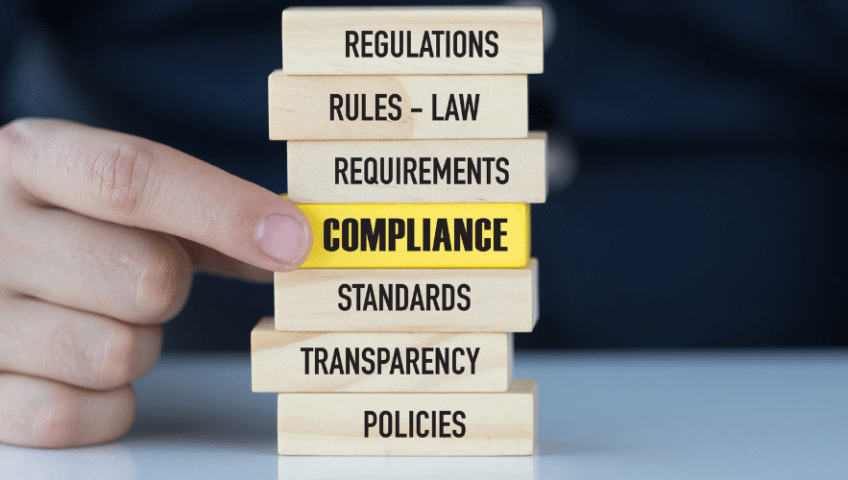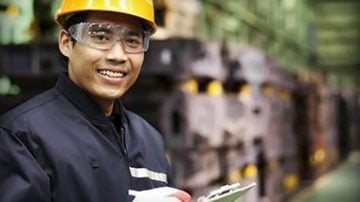Occupational health and safety (OH&S) laws ensure workplace safety and protect the well-being of industrial workers in Mexico. These laws establish a framework of regulations and standards that employers must follow to provide a safe and healthy working environment.
There are 4 key areas covered by OH&S laws in Mexico, including safety standards, health regulations, organizational requirements, and personal protective equipment (PPE) guidelines. Understanding these laws and their implications, helps employers ensure compliance and prioritize the safety and well-being of their employees.
Industry Safety Standards in Mexico
Safety standards outlined in Mexican occupational health and safety laws play a large role in ensuring workplace safety and preventing accidents. These standards encompass specific safety measures and requirements that address various aspects of hazards, equipment, machinery, and working conditions.
-
- Hazard Prevention and Control: Mexican OH&S laws emphasize the identification, assessment, and control of workplace hazards including conducting regular risk assessments, implementing measures to eliminate or minimize hazards, and providing proper training on hazard recognition and control.
- Equipment and Machinery Safety: Safety standards in Mexico also focus on the proper maintenance, inspection, and use of equipment and machinery in the workplace. Employers are required to provide training on safe equipment operation, conduct regular inspections, and maintain records of maintenance activities.
-
- Working Conditions: Mexican OH&S laws address various factors related to working conditions to ensure the well-being of employees. This includes topics such as adequate lighting, temperature control, ventilation, and ergonomics.
Industry Health Standards in Mexico (Estándares de Salud de la Industria en México)
Mexican occupational health and safety laws mandate a range of health-related standards to protect workers' well-being and prevent occupational illnesses. These standards address various topics, including exposure to hazardous substances, ergonomics, ventilation, and medical surveillance.
- Exposure to Hazardous Substances: Mexican OH&S laws require employers to control and minimize workers' exposure to hazardous substances in the workplace. This involves implementing measures such as proper labeling, providing safety data sheets, and offering training on handling and storage procedures.
- Ergonomics: Health standards in Mexico focus on ergonomics to prevent musculoskeletal disorders and promote worker comfort. Employers are required to assess and improve ergonomic conditions to minimize physical strain and provide suitable workstations, chairs, and equipment.
- Ventilation: Mexican OH&S laws require employers to ensure adequate ventilation systems that control air quality, temperature, and humidity levels. This helps prevent the accumulation of harmful substances or pollutants that can lead to respiratory issues or discomfort. In industries like manufacturing or construction, where fumes or dust are generated, proper ventilation is crucial to protect workers from respiratory hazards.
- Medical Surveillance: Employers may be required to provide periodic medical examinations or screenings for employees exposed to specific occupational hazards. This helps identify potential health issues early on, enabling timely intervention and preventing the progression of occupational illnesses. For instance, employees working with asbestos may undergo regular lung function tests to monitor their respiratory health.
Industry Organization Standards in Mexico (Estándares de Organización de la Industria en México)
These standards outline requirements related to safety policies and procedures, emergency preparedness, incident reporting, and employee involvement.
- Safety Policies and Procedures: These policies establish guidelines and expectations for maintaining a safe work environment. They outline responsibilities, procedures for hazard identification and control, and protocols for ensuring compliance with safety regulations.
- Emergency Preparedness: These plans encompass procedures for responding to various emergencies, such as fires, natural disasters, or chemical spills. They may involve conducting regular drills, establishing evacuation routes, and designating responsible personnel for coordinating emergency responses.
- Incident Reporting: Employers are required to have incident reporting systems in place, enabling employees to report any safety-related incidents promptly.
- Employee Involvement: Organizations are encouraged to establish safety committees or programs where employees can participate in identifying hazards, suggesting improvements, and providing feedback on safety practices.
Personal Protective Equipment (PPE) Standards in Mexico (Estándares de Equipos de Protección Personal (EPP) en México)
Mexican occupational health and safety regulations establish specific standards for Personal Protective Equipment (PPE) to ensure the safety of workers.
Types of PPE (EPP)
- Head protection: Hard hats or helmets to protect against falling objects or head injuries.
- Eye and face protection: Safety glasses, goggles, or face shields to safeguard against flying particles, chemicals, or other eye hazards.
- Hearing protection: Earplugs or earmuffs to reduce exposure to loud noises or prevent hearing loss.
- Respiratory protection: Masks or respirators to prevent inhalation of harmful substances, such as dust, fumes, or toxic gasses.
- Hand and arm protection: Gloves, sleeves, or gauntlets to shield against cuts, burns, chemical exposure, or other hand/arm hazards.
- Foot protection: Safety shoes or boots with protective toe caps or puncture-resistant soles to prevent foot injuries.
- Body protection: Protective clothing, such as coveralls, aprons, or vests, to guard against chemical splashes, heat, or other bodily hazards.
Employer PPE (EPP) Responsibilities
Mexican OH&S regulations place the onus on employers to provide appropriate PPE to their employees. Employers must assess workplace hazards, determine the necessary PPE, and ensure its availability and proper maintenance. They are responsible for selecting PPE that meets relevant safety standards and providing training on its correct use, care, and limitations. Employers operating in Mexico must also regularly inspect and replace damaged or worn-out PPE to maintain its effectiveness.
Proper Use of (EPP)PPE
Employees are obligated to use PPE as instructed by their employers and follow established safety protocols. They should wear PPE properly, ensure a proper fit and adjustment, and use it consistently in designated areas or situations where hazards exist. Employees must report any issues or concerns regarding PPE to their supervisors and seek guidance if they require further training or assistance.
Benefits and Implications of Occupational Health and Safety Laws (Beneficios e implicaciones de las leyes de seguridad y salud ocupacional)
Occupational health and safety laws bring numerous benefits to both Mexican employers and employees. Adhering to these standards improves workplace safety by identifying and mitigating potential hazards, and reducing the risk of accidents and injuries. This not only protects employees from harm but also enhances their overall well-being, leading to increased job satisfaction and productivity. Employers benefit from reduced absenteeism, lower compensation costs, and improved employee morale.
Failure to adhere to occupational health and safety laws can result in penalties, legal consequences, and reputational damage. Non-compliance may lead to fines, lawsuits, and even criminal charges in severe cases. Businesses operating in Mexico that disregard worker safety may face negative publicity, damaging their reputation and customer trust. Mexico’s employers must prioritize compliance with these laws to ensure a safe and healthy work environment, protect their employees, and maintain their standing within the industry.
Achieve and Maintain Safety Regulation Compliance in Mexico (Lograr y mantener el cumplimiento de las normas de seguridad en México)
Occupational health and safety laws in Mexico help safeguard employees' lives and health. General contractors operating in Mexico should prioritize compliance with the safety regulations outlined in OH&S laws. Achieving and maintaining regulatory compliance in industrial workplaces can be challenging. Safety regulations can be updated or changed as new information or new technology becomes available in the industry. Staying up to date with these changes can be made easier with the help of a safety compliance consultant who specializes in safety compliance and safety regulation laws.
Headquartered in the United States, Industrial Compliance & Safety offers international services extending around the globe. We're your trusted partner for global compliance consultation, whether your company operates internationally or seeks to expand its reach beyond domestic boundaries.
Regardless of the certification you require assistance with, we offer a comprehensive range of safety compliance services. These encompass everything from Initial Account Setup to Account Maintenance. Furthermore, we extend a Brick & brick-and-mortar package, providing you with essential tools and direct access to our customer service team, empowering you to navigate the certification process independently.
Choose Industrial Compliance & Safety for a truly global approach to safety compliance certification. Let us be your partner in ensuring that you're not just compliant but also well-prepared and efficient in your operations, whether locally or across international borders.
Ready To Get Compliant Today?
Call us or complete the form below!





